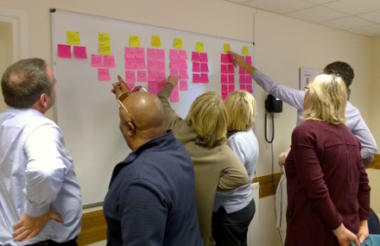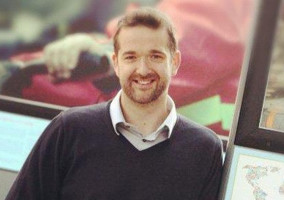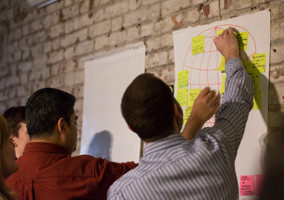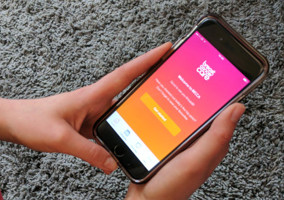Unlock works to provide a voice and support for people with convictions who are facing stigma, obstacles and discrimination. With 11 million people in the UK having a criminal record, our potential user group is huge.
As a small charity with limited resources, we recognised several years ago that the only way we would be able to help more people without increasing calls to our busy and over-stretched volunteer-manned helpline was through the use of digital technology. However, like many small charities there is often a difficult trade-off; we want to innovate but where innovation requires investment being bold and taking ‘risks’ can be difficult.
In 2017, the Charity Digital Skills Report found that 57 per cent of charities cited a lack of skills as the biggest barrier to getting more from digital and although we wouldn’t consider ourselves to be digital virgins, most of what we know we’ve taught ourselves. We knew that if we wanted to be bolder we would need a bit of help.
Things changed for us last year when we heard about CAST and more importantly, their Digital Fellowship. I was fortunate enough to be selected to join the Fellowship and so began approximately 10 weeks of regular workshops with 11 other Fellows. The sessions were intense, but exploring many aspects of digital service development and being able to work with other Fellows who knew very little about our organisations helped us separate our assumptions about our client’s expectations with their actual requirements. From this, we were able identify a problem without having to come up with a solution.
These sessions ultimately led up to a design workshop which took place in our office, facilitated by CAST and design and development co-operative InFact. The workshop gave all our staff and volunteers the opportunity to take time out from their usual jobs and devote some time to ‘think digital’. For some, this meant that rather than viewing digital as a necessary distraction they started to think about how it could be used as a potential solution to some of the problems we were facing. In particular, we wanted to find a way to reduce the number of calls to our helpline that related to simple questions, so that we could free up our volunteers’ time to focus on more challenging discussions.
Prior to the workshop, we had undertaken a survey of all callers who contacted our helpline to establish whether they were aware of our online information site and whether they’d used it. The results showed that many callers had visited the site but either couldn’t find the answer to their question or needed further clarification. During the workshop we mapped a user’s journey and found that despite having comprehensive information we needed a much better way to help users navigate to information relevant to their particular circumstances.
Creating a chatbot
What followed the workshop was a four-day mini design sprint where the developers at InFact worked with us to create a proof of concept chatbot to see if it helped solve this problem. The chatbot would conduct a ‘conversation’ with visitors on one of our information pages would make a great minimal viable product (MVP) which could then be tested with users. While most of the hard work during the sprint was down to the developers it was still necessary for me to make myself available throughout the four days to answer their questions and provide information and feedback. They shared GitHub with me, a development platform that I’d never come across before, but which quickly became my best friend as it helped me easily project manage the work they were doing.
Unveiling the MVP to the rest of the Unlock team and asking them to test it was both exciting and frightening. However, everybody was amazed with what had been achieved in such a short space of time and could see how we could ‘roll it out’ for use on other pages of the site.
We’re now looking for how we can take the chatbot forwards. One option is to partner with an existing tech for good startup that has created its own chatbot technology already for a different user group. We’re exploring whether we can work with them to reuse the content we’ve already got in our MVP on their platform, which works through Facebook and as a website pop-up. Either way, we’re planning to test the chatbot with our external users and their feedback will pave the way for a finalised version and enable us to start thinking about other ways we can use it.
We’re also using the skills I learned on the Fellowship to improve other online services. For example we created a new way of navigating the information hub called Seven Stages of a Criminal Record. We knew from feedback that people visiting the site often struggled to find the right content because they didn’t know what they didn’t know, so the seven stages helps them identify where they are on their criminal record journey and find the right content at each stage. Feedback on this has been good and we’re now making adjustments based on users’ comments.
We also recently added a tool to our website called ‘Leading Charities with Conviction’, which helps people with a criminal record understand new legislation around whether they’d need a waiver to become a trustee or senior manager of a charity. I created it on Typeform to display the guidance in an accessible, interactive click-through format. We’d written the guidance already so the questions were already there - the difficulty was trying to put in logic jumps so that people went to the right place. But it took me just three or four days to build, get feedback and tweak the tool, and it has already been used by over 200 people. The legislation comes into effect on 1st August and that’ll be the real test, but now we’ve upgraded our Typeform subscription we’re going to use this for other things in future as well.
In summary, the Digital Fellowship gave me an amazing opportunity to learn about digital design and development and has wetted my appetite to learn more. It’s made me realise that there’s so much more to digital than I’d first thought and at a time when the charity sector is facing many challenges, using digital well will help us be more sustainable, relevant and reach more people.
Debbie will be speaking about Unlock’s digital adventures at the next NetSquared London Meetup, at Newspeak House on Thursday 19 July.
Related articles











